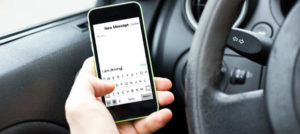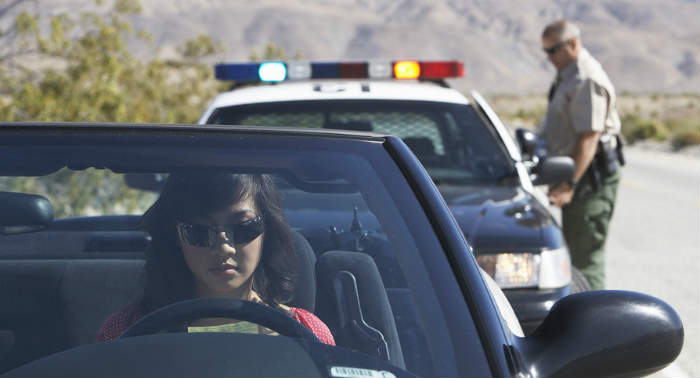
We are all familiar with the fact that police use instruments to measure a driver’s blood-alcohol content (BAC) if they suspect impaired driving, particularly after an accident.
Other similar instruments can measure BAC from sweat and, in some cases, police may obtain court orders to draw and test blood samples.
In short, the breathalyzer is accepted as a legal tool in the enforcement of drunk driving laws, even if criminal defense attorney may challenge the results of the test.
As our country tries to come to grips with the thousands of deaths and hundreds of thousands of injuries in distracted driving accidents each year, some traffic safety advocates are suggesting the use of the textalyzer, a tool to tell police how recently a driver may have been using their cellphone or texting while driving.
What is a Textalyzer?
At this point, the textalyzer is merely a concept. That’s right: they don’t exist. But the New York Assembly is considering a bill that would require police to test a device known as the textalyzer.
Here’s a New York Times description of the textalyzer:
The technology could determine whether a driver had used the phone to text, email or do anything else that is forbidden under New York’s hands-free driving laws, which prohibit drivers from holding phones to their ear. Failure to hand over a phone could lead to the suspension of a driver’s license, similar to the consequences for refusing a Breathalyzer.
An article in the American Bar Association’s ABA Journal adds:
A Wired magazine article explains that “police stingray spy tools” are already being used, which can record numbers from a mobile phones’ incoming and outgoing calls, and can intercept the content of voice and text communications.
The textalyzer “supposedly would not scrape the content off your smartphone — that would require a warrant under the Supreme Court’s 2014 ruling. The device would be programmed instead only to check whether the phone had been recently used,” according to a Bloomberg View article.
A Japanese-owned company known as Cellebrite Inc., which makes technology that helps investigators unlock mobile devices, is working to create the textalyzer, according to CNN.
With Cellebrite’s technology, a police officer would connect a person’s phone to the officer’s laptop or other device and detect only the operating system logs, which would provide information about touchscreen use and whether someone was typing at the time of a crash.
“We’re specifically designing it to protect the privacy of the user,” Jim Grady, chief executive officer of Cellebrite Inc. Americas told CNN. “So it’s particularly important not to say who you were texting or what you said in those texts, but instead just the evidence that you were texting and specifically, things like … the way you hit the keyboard and the frequency.”
Are Textalyzers (as Proposed) Lawful?

As the law stands today, police must obtain a search warrant to go through a suspect’s cellphone records. But with a textalyzer, an officer could effectively look at each app on your phone and see how recently you had used it. If one showed activity a minute or two before a crash, it would suggest a possible distracted driver.
A unanimous Supreme Court decision in Riley v. California held that police are required to obtain a warrant when searching a cellphone, unless urgent circumstances exist. However, use of a breathalyzer is legal, as is taking your driver’s license if you refuse a breathalyzer test.
In the Bloomberg View article, Noah Feldman, a professor of constitutional and international law at Harvard University, asks which is more intrusive: checking your phone or checking your body chemistry?
Feldman raises additional questions, which might ultimately come before the Supreme Court:
- The textalyzer might examine your phone at one level, but does it create a slippery slope? Once the police have access to your phone, will they really stop themselves from fully searching it?
- If you had to unlock your phone for a textalyzer to work, could police require you to take this potentially incriminating step?
- If the court holds in a case under consideration that breathalyzer tests aren’t unreasonable searches, how could it say later that checking whether you’ve texted is more invasive?
“It (the N.Y. bill if passed) really invites police to seize phones without justification or warrant,” Donna Lieberman, the executive director of the New York chapter of the American Civil Liberties Union, told The Times.
But legislators backing the textalyzer bill say it relies on the concept of “implied consent,” just a breathalyzer testing does. This suggests that by accepting a driver’s license you agree to submit to a breathalyzer test if asked. No one forces you to get a driver’s license and give up your Fourth Amendment right to be free of unreasonable searches.
Erika Lorshbough, legislative counsel at the New York Civil Liberties Union, told the ABA Journal that two issues exist in a drunk driving case that are not present in a distracted-driving crash. The first is that the body will metabolize the alcohol, so evidence will disappear if a field sobriety test is not conducted. Second, there is a public safety interest in not letting drivers get back on the road if they are intoxicated.
The ABA Journal refers to a Stanford University study of cellphone metadata, which raises additional privacy concerns. It concluded that simply the numbers dialed and the times and lengths of calls gathered from a cellphone can be used to uncover a variety of users’ personal data, such as medical information. In addition, the original data collected can be used to infer facts about people “two hops” away, meaning not just who the suspect calls, but also who the suspect’s contacts call.
Is the Textalyzer Headed for North Carolina Roads?
What do you think about the prospects of police using textalyzers in future roadside stops? Would you feel violated by a textalyzer search of your phone? Or would you want police to gather any information they could in a crash that injured you or a loved one?
Are textalyzers the answer to texting-while-driving and the threat this kind of distracted driving represents?
Our experience tells us that, unfortunately, reckless and negligent drivers will always be with us.
As for whether police should be equipped with textalyzers, we have some concerns that are as strong as our desire to hold accountable those who would risk others’ lives, as well as their own, by texting while driving.




Leave a comment